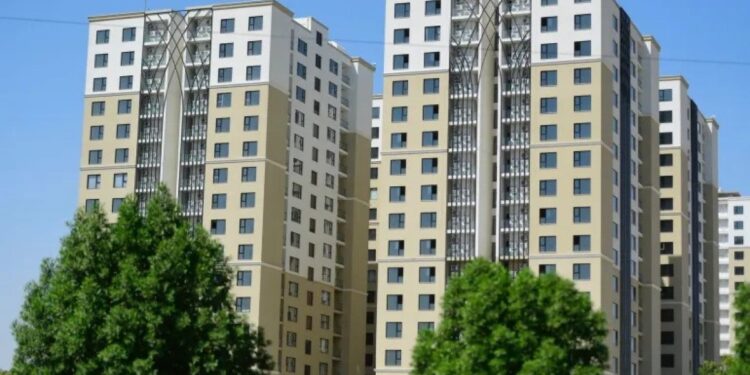Iraq is witnessing a noticeable rise in real estate prices, which poses a major challenge for Iraqis, especially after years of internal conflicts and political and economic instability.
This rise is attributed – according to observers – to several factors, most notably money laundering and poor planning, which are factors that interact with each other to produce an unstable and unpredictable real estate market.
Real estate and money laundering
The judge of the Integrity and Money Laundering Court, Iyad Mohsen Damad, confirmed in previous press statements that real estate is the sector most targeted by money laundering crimes.
Damad stated, “Because of the strict control imposed by the financial systems at the local and international levels on the movement of funds and the necessity of knowing their sources before accepting their deposit in banks or making bank transfers regarding them, perpetrators of predicate crimes resort to many methods aimed at cutting the money’s connection to the crime that produced it and revealing the dirty money.” “As if it were legitimate money resulting from legal projects and actions.”
Real estate prices in some areas of the capital, Baghdad, reached $20,000 per meter, and in other areas they ranged between $3,500 and $14,000 per square meter at a minimum, according to statistics announced on the Al-Yaqeen Company for Real Estate and General Investments Facebook page.
On April 18, 2023, the Central Bank of Iraq announced its decision to supervise the sale of real estate through banks in coordination with the real estate registration departments to prevent money laundering.
The Central Bank stated in a statement that the process of selling any property whose value exceeds 500 million Iraqi dinars ($378,000) will be conditional on placing the money in banks and giving notice to the Real Estate Registration Department before starting the ownership transfer transaction.
Financial expert Safwan Qusay said in an interview with Al Jazeera Net that there are a large number of investors in the real estate market who have entered into the establishment of integrated cities, with the aim of reducing the volume of demand for these properties and transferring their market to a regular market.
However, Qusay points out that the previous period witnessed the presence of large amounts of money with irregular traders, especially drug dealers and tax evaders, who try to change this money into official money by entering the real estate market.
It was noted that there were many properties that were purchased but were not exploited, according to the same spokesman.
Qusay believes that the Central Bank of Iraq and the Ministry of Finance are the two parties concerned with controlling trading in the real estate market, calling for support for the construction sector to control demand and govern buying and selling procedures in this sector.
The National Investment Authority indicates the number of housing units based on the data available from the Ministry of Planning and Development Cooperation in each governorate, which amounts to a total of 988 thousand housing units.
The construction sector represents 2.3% of the Iraqi gross domestic product annually, according to the latest statistics of the Ministry of Finance last year.
Challenges of the housing sector in Iraq
For his part, economic expert Duraid Al-Anazi believes that the most prominent major challenge facing the housing sector in Iraq is the neglect of previous strategic plans for housing in Iraq, “low- and middle-income categories,” which has led to the presence of about 25 million Iraqis who do not own housing units.
Al-Enezi said in an interview with Al-Jazeera Net that this neglect reflects the authorities’ lack of interest in meeting the needs of these two vulnerable groups in society.
Al-Enezi added that the process of constructing housing units has become class discrimination, as luxury housing units were allocated to people with high incomes, while other groups were ignored.
This situation – according to the same speaker – reflects the lack of justice in the distribution of housing resources, calling for setting the price per square meter to combat cases of price manipulation and support housing stability for the benefit of low-income groups.
He said, “There are not enough land areas to build residential complexes for people with limited income, especially after exploiting all the available spaces, to the point of seizing parts of schools and mosques to create residential complexes.”
Al-Enezi considered that the 40% increase in real estate tax was a cause of disruption to the sector, and increased the difficulty of achieving housing stability for citizens.
Al-Enezi believes it is necessary to develop the local construction materials industry to reduce the cost of construction instead of relying on construction materials factories in neighboring countries.
He added, “Financial support must be provided to low- and middle-income groups by providing long-term loans on concessional terms, in addition to identifying suitable areas to build residential complexes for people with limited income.”
Providing housing is a government priority
On July 28, 2024, the Iraqi government confirmed, through the financial advisor to the Prime Minister, Mazhar Muhammad Saleh, that the residential city projects taking place in Iraq are prepared according to integrated steps in the development direction, indicating that construction activity in the residential urban sector comes at the forefront of building material capital wealth. List in Iraq.
Saleh said during his speech to the official Iraqi Agency (INA) that “the government’s vision and economic approach are based on stimulating the principle of partnership with the private sector, as the productive partnership took its priority by granting sovereign guarantees to industrial projects related to infrastructure and reconstruction in the country,” noting that all projects are prepared in accordance with Important and integrated steps to provide families with adequate housing and financing.



